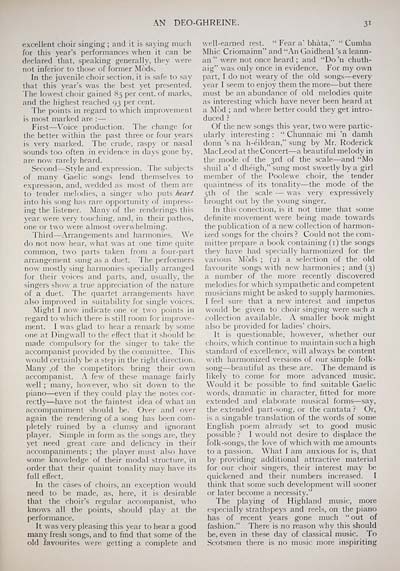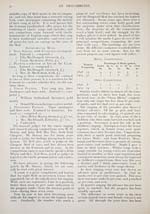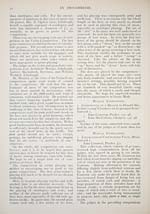Blair Collection > Deo-gréine
(47)
Download files
Complete book:
Individual page:
Thumbnail gallery: Grid view | List view

AN DEO-GHREINE.
3 1
excellent choir singing ; and it is saying much
for this year's performances when it can be
declared that, speaking generally, they were
not inferior to those of former Mods.
In the juvenile choir section, it is safe to say
that this year's was the best yet presented.
The lowest choir gained 85 per cent, of marks,
and the highest reached 93 per cent.
The points in regard to which improvement
is most marked are : —
First — Voice production. The change for
the better within the past three or four years
is very marked. The crude, raspy or nasal
sounds too often in evidence in days gone by,
are now rarely heard.
Second — Style and expression. The subjects
of many Gaelic songs lend themselves to
expression, and, wedded as most of them are
to tender melodies, a singer who puts heart
into his song has rare opportunity of impress-
ing the listener. Many of the renderings this
year were very touching, and, in their pathos,
one or two were almost overwhelming.
Third — Arrangements and harmonies. We
do not now hear, what was at one time quite
common, two parts taken from a four-part
arrangement sung as a duet. The performers
now mostly sing harmonies specially arranged
for their voices and parts, and, usually, the
singers show a true appreciation of the nature
of a duet. The quartet arrangements have
also improved in suitability for single voices.
Might I now indicate one or two points in
regard to which there is still room for improve-
ment. I was glad to hear a remark by some
one at Dingwall to the effect that it should be
made compulsory for the singer to take the
accompanist provided by the committee. This
would certainly be a step in the right direction.
Many .of the competitors bring their own
accompanist. A few of these manage fairly
well ; many, however, who sit down tò the
piano — even if they could play the notes cor-
rectly — have not the faintest idea of what an
accompaniment should be. Over and over
again the rendering of a song has been com-
pletely ruined by a clumsy and ignorant
player. Simple in form as the songs are, they
yet need great care and delicacy in their
accompaniments ; the player must also have
some knowledge of their modal structure, in
order that their quaint tonality may have its
full effect.
In the cases of choirs, an exception would
need to be made, as, here, it is desirable
that the choir's regular accompanist, who
knows all the points, should play at the
performance.
It was very pleasing this year to hear a good
man)" fresh songs, and to find that some of the
old favourites were getting a complete and
well-earned rest. " Fear a' bhàta," " Cumha
Mhic Criomainn" and "An Gaidheal 's a leann-
an " were not once heard ; and "Do 'n chuth-
aig" was only once in evidence. For my own
part, I do not weary of the old songs — every
year I seem to enjoy them the more — but there
must be an abundance of old melodies quite
as interesting which have never been heard at
a Mod ; and where better could they get intro-
duced ?
Of the new songs this year, two were partic-
ularly interesting : " Chunnaic mi 'n damh
donn 's na h-eildean," sung by Mr. Roderick
MacLeod at the Concert — a beautiful melody in
the mode of the 3rd of the scale — and "Mo
shuil a' d dhèigh," sung most sweetly by a girl
member of the Poolewe choir, the tender
quaintness of its tonality — the mode of the
5th of the scale — was very expressively
Drought out by the young singer.
In this collection, is it not time that some
definite movement were being made towards
the publication of a new collection of harmon-
ized songs for the choirs ? Could not the com-
mittee prepare a book containing (1) the songs
they have had specially harmonized for the
various Mods ; (2) a selection of the old
favourite songs with new harmonies ; and (3)
a number of the more recently discovered
melodies for which sympathetic and competent
musicians might be asked to supply harmonies.
I feel sure that a new interest and impetus
would be given to choir singing were such a
collection available. A smaller book might
also be provided for ladies' choirs.
It is questionable, however, whether our
choirs, which continue to maintain such a high
standard of excellence, will always be content
with harmonized versions of our simple folk-
song — beautiful as these are. The demand is
likely to come for more advanced music.
Would it be possible to find suitable Gaelic
words, dramatic in character, fitted for more
extended and elaborate musical forms — say,
the extended part-song, or the cantata ? Or,
is a singable translation of the words of some
English poem already set to good music
possible ? I would not desire to displace the
folk-songs, the love of which with me amounts
to a passion. What I am anxious for is, that
by providing additional attractive material
for our choir singers, their interest may be
quickened and their numbers increased. I
think that some such development will sooner
or later become a necessity."
The playing of Highland music, more
especially strathspeys and reels, on the piano
has of recent years gone much " out of
fashion." There is no reason why this should
be, even in these day of classical music. To
Scotsmen there is no music more inspiriting
3 1
excellent choir singing ; and it is saying much
for this year's performances when it can be
declared that, speaking generally, they were
not inferior to those of former Mods.
In the juvenile choir section, it is safe to say
that this year's was the best yet presented.
The lowest choir gained 85 per cent, of marks,
and the highest reached 93 per cent.
The points in regard to which improvement
is most marked are : —
First — Voice production. The change for
the better within the past three or four years
is very marked. The crude, raspy or nasal
sounds too often in evidence in days gone by,
are now rarely heard.
Second — Style and expression. The subjects
of many Gaelic songs lend themselves to
expression, and, wedded as most of them are
to tender melodies, a singer who puts heart
into his song has rare opportunity of impress-
ing the listener. Many of the renderings this
year were very touching, and, in their pathos,
one or two were almost overwhelming.
Third — Arrangements and harmonies. We
do not now hear, what was at one time quite
common, two parts taken from a four-part
arrangement sung as a duet. The performers
now mostly sing harmonies specially arranged
for their voices and parts, and, usually, the
singers show a true appreciation of the nature
of a duet. The quartet arrangements have
also improved in suitability for single voices.
Might I now indicate one or two points in
regard to which there is still room for improve-
ment. I was glad to hear a remark by some
one at Dingwall to the effect that it should be
made compulsory for the singer to take the
accompanist provided by the committee. This
would certainly be a step in the right direction.
Many .of the competitors bring their own
accompanist. A few of these manage fairly
well ; many, however, who sit down tò the
piano — even if they could play the notes cor-
rectly — have not the faintest idea of what an
accompaniment should be. Over and over
again the rendering of a song has been com-
pletely ruined by a clumsy and ignorant
player. Simple in form as the songs are, they
yet need great care and delicacy in their
accompaniments ; the player must also have
some knowledge of their modal structure, in
order that their quaint tonality may have its
full effect.
In the cases of choirs, an exception would
need to be made, as, here, it is desirable
that the choir's regular accompanist, who
knows all the points, should play at the
performance.
It was very pleasing this year to hear a good
man)" fresh songs, and to find that some of the
old favourites were getting a complete and
well-earned rest. " Fear a' bhàta," " Cumha
Mhic Criomainn" and "An Gaidheal 's a leann-
an " were not once heard ; and "Do 'n chuth-
aig" was only once in evidence. For my own
part, I do not weary of the old songs — every
year I seem to enjoy them the more — but there
must be an abundance of old melodies quite
as interesting which have never been heard at
a Mod ; and where better could they get intro-
duced ?
Of the new songs this year, two were partic-
ularly interesting : " Chunnaic mi 'n damh
donn 's na h-eildean," sung by Mr. Roderick
MacLeod at the Concert — a beautiful melody in
the mode of the 3rd of the scale — and "Mo
shuil a' d dhèigh," sung most sweetly by a girl
member of the Poolewe choir, the tender
quaintness of its tonality — the mode of the
5th of the scale — was very expressively
Drought out by the young singer.
In this collection, is it not time that some
definite movement were being made towards
the publication of a new collection of harmon-
ized songs for the choirs ? Could not the com-
mittee prepare a book containing (1) the songs
they have had specially harmonized for the
various Mods ; (2) a selection of the old
favourite songs with new harmonies ; and (3)
a number of the more recently discovered
melodies for which sympathetic and competent
musicians might be asked to supply harmonies.
I feel sure that a new interest and impetus
would be given to choir singing were such a
collection available. A smaller book might
also be provided for ladies' choirs.
It is questionable, however, whether our
choirs, which continue to maintain such a high
standard of excellence, will always be content
with harmonized versions of our simple folk-
song — beautiful as these are. The demand is
likely to come for more advanced music.
Would it be possible to find suitable Gaelic
words, dramatic in character, fitted for more
extended and elaborate musical forms — say,
the extended part-song, or the cantata ? Or,
is a singable translation of the words of some
English poem already set to good music
possible ? I would not desire to displace the
folk-songs, the love of which with me amounts
to a passion. What I am anxious for is, that
by providing additional attractive material
for our choir singers, their interest may be
quickened and their numbers increased. I
think that some such development will sooner
or later become a necessity."
The playing of Highland music, more
especially strathspeys and reels, on the piano
has of recent years gone much " out of
fashion." There is no reason why this should
be, even in these day of classical music. To
Scotsmen there is no music more inspiriting
Set display mode to: Large image | Transcription
Images and transcriptions on this page, including medium image downloads, may be used under the Creative Commons Attribution 4.0 International Licence unless otherwise stated. ![]()
| Early Gaelic Book Collections > Blair Collection > Deo-gréine > (47) |
|---|
| Permanent URL | https://digital.nls.uk/76698210 |
|---|
| Description | A selection of books from a collection of more than 500 titles, mostly on religious and literary topics. Also includes some material dealing with other Celtic languages and societies. Collection created towards the end of the 19th century by Lady Evelyn Stewart Murray. |
|---|
| Description | Selected items from five 'Special and Named Printed Collections'. Includes books in Gaelic and other Celtic languages, works about the Gaels, their languages, literature, culture and history. |
|---|

